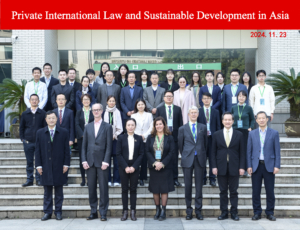Views
UK Supreme Court in Jalla v Shell: the claim in Bonga spill is time barred
The UK Supreme Court ruled that the cause of action in the aftermath of the 2011 Bonga offshore oil spill accrued at the moment when the oil reached the shore. This was a one-off event and not a continuing nuisance. The Nigerian landowners’ claim against Shell was thus barred by the limitation periods under applicable Nigerian law (Jalla and another v Shell International Trading and Shipping Company and another [2023] UKSC 16, on appeal from [2021] EWCA Civ 63).
On 10 May 2023, the UK Supreme Court has ruled in one of the cases in the series of legal battles started against Shell in the English courts in the aftermath of the Bonga spill. The relevant facts are summarized by the UK Supreme Court as follows at [6] and [7]:
Data on Choice-of-Court Clause Enforcement in US
The United States legal system is immensely complex. There are state courts and federal courts, state statutes and federal statutes, state common law and federal common law. When I imagine a foreign lawyer trying to explain this system to a foreign client, my heart fills with pity.
This feeling of pity is compounded when I imagine this same lawyer trying to advise her client as to whether a choice-of-court clause will be enforced by a court in the United States. The law on this subject is complicated. It is, moreover, not easy to determine how it is applied in practice. Are there differences in clause enforcement rates across the states? Across federal circuits? Do state courts enforce these clauses at the same rate as federal courts? Until recently, there was no data that would allow a foreign lawyer – or a U.S. lawyer, for that matter – to answer any of these questions.
Over the past several years, I have authored or co-authored several empirical articles that seek to answer the questions posed above. This post provides a summary of the data gathered for these articles. All of the cases referenced involve outbound choice-of-court clauses, i.e. clauses that select a jurisdiction other than the one where the suit was filed. Readers interested in the data collection process, the caveats to which the data is subject, or other methodological issues should consult the articles and their appendices. This post first describes state court practice. It then describes federal court practice. It concludes with a brief discussion comparing the two.
Polish Constitutional Court about to review the constitutionality of the jurisdictional immunity of a foreign State?
Written by Zuzanna Nowicka, lawyer at the Helsinki Foundation for Human Rights and lecturer at Department of Logic and Legal Argumentation at University of Warsaw
In the aftermath of the judgment of the ICJ of 2012 in the case of the Jurisdictional Immunities of the State (Germany v. Italy: Greece intervening) that needs no presentation here (for details see, in particular, the post by Burkhard Hess), by its judgment of 2014, the Italian Constitutional Court recognized the duty of Italy to comply with the ICJ judgment of 2012 but subjected that duty to the “fundamental principle of judicial protection of fundamental rights” under Italian constitutional law (for a more detailed account of those developments see this post on EAPIL by Pietro Franzina and further references detailed there). In a nutshell, according to the Italian Constitutional Court, the fundamental human rights cannot be automatically and unconditionally sacrificed in each and every case in order to uphold the jurisdiction immunity of a foreign State allegedly responsible for serious international crimes.
Since then, the Italian courts have reasserted their jurisdiction in such cases, in some even going so far as to decide on the substance and award compensation from Germany. The saga continues, as Germany took Italy to the ICJ again in 2022 (for the status of the case pending before the ICJ see here). It even seems not to end there as it can be provocatively argued that this saga has its spin-off currently taking place before the Polish courts.
News
Private International Law and Sustainable Development in Asia at Wuhan University – Report
By Zixuan Yang, a PhD student at Max Planck Institute for Comparative and International Private Law in Hamburg, Germany.
The Conference on Private International Law and Sustainable Development in Asia was successfully held at Wuhan University School of Law on 23rd November 2024. This international symposium was organized by Wuhan University Academy of International Law and Global Governance, Wuhan University School of Law and China Society of Private International Law. Following a Call for Papers of the Chinese Journal of Transnational Law (CJTL), the symposium provided an ideal platform for participants to critically and constructively engage with the functions, methodologies and techniques of private international law in relation to sustainable development from the Asian perspective. Distinguished legal experts and scholars from Japan, India, Vietnam, Singapore, Hong Kong SAR, Macao SAR, Taiwan, Mainland China, Germany and the Netherlands delivered presentations and participated in discussions on-site and online.

After Professor Zheng Tang opened the conference, vice President of the China Law Society, President of the China Society of International Law and President of the China Society of Private International Law, offered a welcome. This was followed by a joint keynote speech from Professor Ralf Michaels (Max Planck Institute for Comparative and International Private Law, Hamburg), Professor Verónica Ruiz Abou-Nigm (University of Edinburgh), and Hans van Loon (former Secretary-General of the Hague Conference on Private International Law) on Private International Law and SDGs 2030. Together with Zheng Tang, they will serve as special editors of an issue in CJTL that brings the papers together. Read more
Report on the 2024 Asia-Pacific Colloquium of the Journal of Private International Law (JPIL)
On 5–6 December 2024, 18 private international lawyers from Australia, Hong Kong, Japan, New Zealand and Singapore came together at the University of Melbourne for the 2024 Asia-Pacific Colloquium of the Journal of Private International Law (JPIL).
The colloquium was the first since 2018, when it had been held in Japan. The 2024 event was expertly hosted by Professor Richard Garnett and Professor Ying Khai Liew of the University of Melbourne Law School, and held at University House at UniMelb’s Parkville campus. Read more
Out Now: New open Access book on Children in Migration and International Family Law (Springer, 2024) by Stefan Arnold & Bettina Heiderhoff
Stefan Arnold (Institute of International Business Law, Chair for Private Law, Philosophy of Law, and Private International Law, University of Münster, Münster, Germany) and Bettina Heiderhoff (Institute for German and International Family Law, Chair for Private International Law, International Civil Procedure Law and German Private Law, University of Münster, Münster, Germany) have recently published an edited book on Children in Migration and International Family Law (Springer, 2024).
The book is an open access title, so it is freely available to all. In the editors’ words, the book aims “to shed light on the often overlooked legal difficulties at the interface between international family law and migration law” (p. 3) with focus placed “on the principle of the best interests of the child and how this principle can be more effectively applied.” (p.4)
The book’s blurb reads as follows:
 This open access book offers readers a better understanding of the legal situation of children and families migrating to the EU. Shedding light on the legal, practical, and political difficulties at the intersection of international family law and migration law, it demonstrates that enhanced coordination between these policy areas is crucial to improving the legal situation of families on the move. It not only raises awareness of these “interface” issues and the need for stakeholders in migration law and international family law to collaborate closely, but also identifies deficits in the statutory framework and suggests possible remedies in the form of interpretation and regulatory measures.
This open access book offers readers a better understanding of the legal situation of children and families migrating to the EU. Shedding light on the legal, practical, and political difficulties at the intersection of international family law and migration law, it demonstrates that enhanced coordination between these policy areas is crucial to improving the legal situation of families on the move. It not only raises awareness of these “interface” issues and the need for stakeholders in migration law and international family law to collaborate closely, but also identifies deficits in the statutory framework and suggests possible remedies in the form of interpretation and regulatory measures.
The book is part of the EU co-financed FAMIMOVE project and includes contributions from international experts, who cover topics such as guardianship, early marriage, age assessment, and kafala from a truly European perspective. The authors’ approach involves a rigorous analysis of the relevant statutory framework, case law, and academic literature, with particular attention given to the best interest of the child in all its facets. The book examines how this principle can be more effectively applied and suggests ways to foster a more fruitful understanding of its regulatory potential.
Given its scope and focus, the book will be of interest to researchers, scholars, and practitioners of Private International Law, Family Law, and Migration Law. It makes a valuable contribution to these fields, particularly at their often-overlooked intersections.
The content of the chapters is succinctly summarized in the introductory chapter of the book, authored by the editors (“Children in Migration and International Family Law: An Introduction,” pp. 11–16). This summary is referenced here as a sort of abstract for each chapter. Read more



